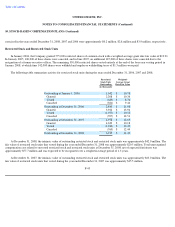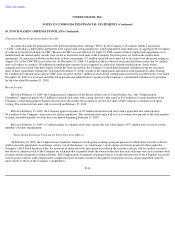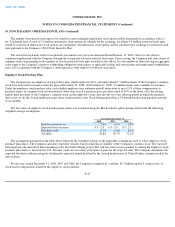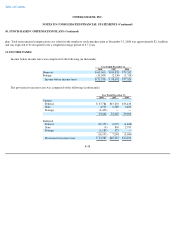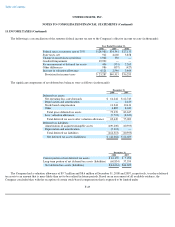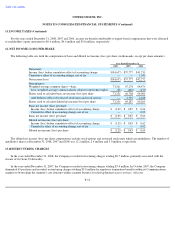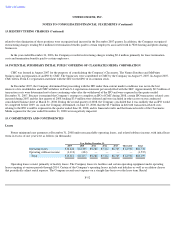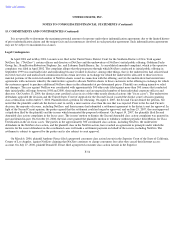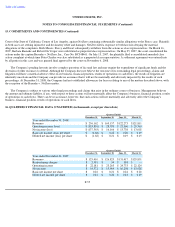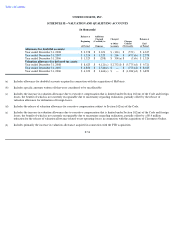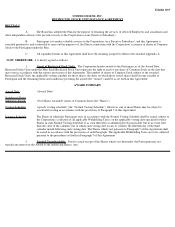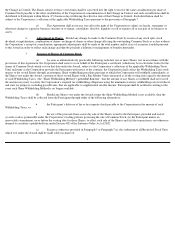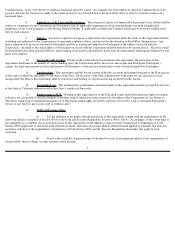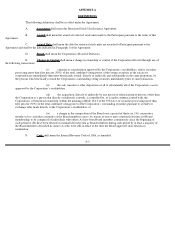Classmates.com 2008 Annual Report Download - page 149
Download and view the complete annual report
Please find page 149 of the 2008 Classmates.com annual report below. You can navigate through the pages in the report by either clicking on the pages listed below, or by using the keyword search tool below to find specific information within the annual report.
Table of Contents
UNITED ONLINE, INC.
NOTES TO CONSOLIDATED FINANCIAL STATEMENTS (Continued)
15. COMMITMENTS AND CONTINGENCIES (Continued)
It is not possible to determine the maximum potential amount of exposure under these indemnification agreements due to the limited history
of prior indemnification claims and the unique facts and circumstances involved in each particular agreement. Such indemnification agreements
may not be subject to maximum loss clauses.
Legal Contingencies
In April 2001 and in May 2001, lawsuits were filed in the United States District Court for the Southern District of New York against
NetZero, Inc. ("NetZero"), certain officers and directors of NetZero and the underwriters of NetZero's initial public offering, Goldman Sachs
Group, Inc., BancBoston Robertson Stephens, Inc. and Salomon Smith Barney, Inc. A consolidated amended complaint, which is the operative
complaint, was filed in April 2002. The complaint alleges that the prospectus through which NetZero conducted its initial public offering in
September 1999 was materially false and misleading because it failed to disclose, among other things, that (i) the underwriters had solicited and
received excessive and undisclosed commissions from certain investors in exchange for which the underwriters allocated to those investors
material portions of the restricted number of NetZero shares issued in connection with the offering; and (ii) the underwriters had entered into
agreements with customers whereby the underwriters agreed to allocate NetZero shares to those customers in the offering in exchange for which
the customers agreed to purchase additional NetZero shares in the aftermarket at pre-determined prices. Plaintiffs are seeking injunctive relief
and damages. The case against NetZero was coordinated with approximately 300 other suits filed against more than 300 issuers that conducted
their initial public offerings between 1998 and 2000, their underwriters and an unspecified number of their individual corporate officers and
directors. On October 13, 2004, the district court certified a class in six of the other nearly identical actions (the "focus cases"). The underwriter
defendants appealed the decision and the United States Court of Appeals for the Second Circuit vacated the district court's decision granting
class certification on December 5, 2006. Plaintiffs filed a petition for rehearing. On April 6, 2007, the Second Circuit denied the petition, but
noted that the plaintiffs could ask the district court to certify a more narrow class than the one that was rejected. Prior to the Second Circuit's
decision, the majority of issuers, including NetZero, and their insurers had submitted a settlement agreement to the district court for approval. In
light of the Second Circuit opinion, the parties agreed that the settlement could no longer be approved, and on June 25, 2007, the court approved
a stipulation filed by the plaintiffs and the issuers which terminated the proposed settlement. On August 14, 2007, the plaintiffs filed Second
Amended class action complaints in the focus cases. The issuers' motion to dismiss the Second Amended class action complaints was granted in
part and denied in part. On October 10, 2008, the trial court granted the plaintiff's motion to withdraw without prejudice their Motion for Class
Certification in the six focus cases. The parties in the approximately 300 coordinated class actions, including NetZero, the underwriter
defendants in the NetZero class action, and the plaintiff class in the NetZero action, have reached an agreement in principle under which the
insurers for the issuer defendants in the coordinated cases will make a settlement payment on behalf of the issuers, including NetZero. The
settlement is subject to approval by the parties and is also subject to court approval.
On March 6, 2006, plaintiff Anthony Piercy filed a purported consumer class action lawsuit in the Superior Court of the State of California,
County of Los Angeles, against NetZero claiming that NetZero continues to charge consumers fees after they cancel their Internet access
account. On July 27, 2006, plaintiff Donald E. Ewart filed a purported consumer class action lawsuit in the Superior
F-54



